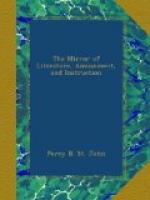“I did not see all this at the time; there was not leisure for it; but I had the general impression, which I reduced into detail afterwards. The spectators forgot everybody but the King and her. His Majesty, at that period of his life, (he was little more than thirty,) looked at his best, and I thought I never saw a manlier face, or a more graceful figure. He was in mulberry coloured velvet and gold. He not only took off his hat in return to our salutations, but persisted in keeping it so, as if in the presence of the whole people of England. This fairly transported us. The royal features were strong, somewhat grim even, and he had a black brow and a swarthy complexion, reminding us of the southern part of his stock; but there was good temper in the smile of his wide though not unhandsome mouth; and his carriage was eminently that of the gentleman. Lady Castlemain at that time was little more than twenty. The Queen, though short of stature, was young also, and looked handsomer than we expected; and as all parties seemed pleased, and his Majesty’s little son came on the other side of the lady of the bed-chamber, we pretended to ourselves, that things were not so bad as report made them; though never more convinced, that everything which had been related was true.”
An animated snatch from court life:
“I passed a delightful winter, carrying messages, going to plays, dining, drinking, dressing, and hearing the King and his courtiers talk. By degrees I was encouraged to talk myself. I got a reputation for being both a hearty and a judicious admirer of wit and poetry, and this procured me the regard of the men I was most anxious to please. Lord Buckhurst liked me because I was discriminating; Sir John Denham, because I listened with respect; Sir Charles Sedley, because none of his similes were lost on me; and Mr. Waller, because I thought him the greatest poet that ever was, I had some misgiving on that point, when I thought of poor Mr. Cowley, who died not long afterwards. Mr. Sprat (lately made Bishop of Rochester, then the Duke of Buckingham’s chaplain,) took me to see that great and good man in his retreat in the country, where he talked so delightfully of rural pleasures, that I began to sigh after my old fields, till I heard him say he had realized nothing but agues, and that the Arcadians in his vicinity were anything but what they should be. He thought, however, he should find them a little higher up the river.”




